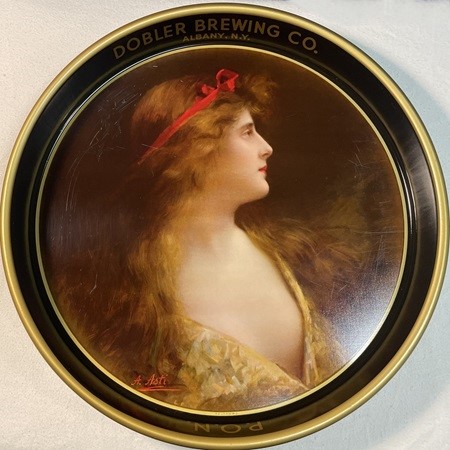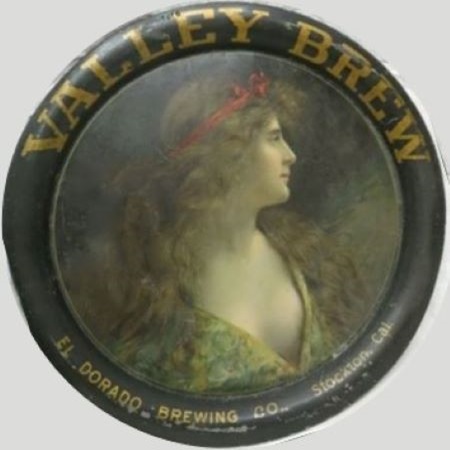The 'Stock' Exchange
The Meek Co.: No. 65 "Annabelle"
The Meek Co.: No. 65 "Annabelle"




General
Unlike No. 64, there is little mystery about No. 65, "Annabelle." It is among the most widely used designs in the entire Tuscarora/Meek & Beach/Meek/AAW catalog. It has the distinction of being one of the few designs that seems to have carried over to the post-prohibition era, being issued by Christian Feigenspan and Dobler Brewing (by that time owned by Feigenspan). Even without those post-pro examples this is an extremely common stock design. While the pre-pro version carries the “Annabelle” title along with stock number and manufacturing information, only the post-pro versions carry the Asti signature. We have been unable to determine a reason for this.
Most people would assume that the name Annabelle is an elaborate pairing of the names Anna and Belle. They’d be wrong. Annabelle is actually derived from an old Anglo-Norman name, Amabel, which is an Old French variant of the Latin “amabilis” meaning ‘loveable.’ The now-defunct name Amabel eventually morphed into Anabel and Mabel. The name enjoyed moderate to low popularity in the first half of the 20th century, then more or less disappeared from usage until it resurged in popularity in the mid 1990’s. "Annabel Lee" is the last complete poem composed by American author Edgar Allan Poe. Like many of Poe's poems, it explores the theme of the death of a beautiful woman.
This design is based on a painting by Italian artist Angelo Asti (1847-1903) who is best known for portraits of beautiful ladies. One difference from the original painting is that on the tray version she faces right, whereas on the original painting she faces left. It is unclear whether that was Asti’s title or one applied by Meek. Asti immigrated to the United States and worked for a lithography company in Cincinnati where he developed his talents as an illustrator. It is unclear if he ever received formal training as a painter, but in the 1890's he returned to France where he studied the Old Masters at the Louvre and eventually had his work accepted by the Salon De Paris amid high praise. Asti’s prolific work was used widely in advertising and some pieces were even produced as porcelain products.
Sahling does not list a stock design for Annabelle in his workbook; however, there is a listing for a “Christ Fiegenspau” <sic> tray 13” from March 1906. Of all the brewery issuers of this design Christian Feigenspan Brewing was by far the most prolific. It appears between his entry for stock design No. 59 “Japanese oblong stock tray” and “Good Friends” stock oblong tray, which is No. 70 in the catalog, which all lines up to strongly indicated the entry for “Christ Fiegenspau” is actually this stock design. We are not aware of another Christian Feigenspan tray that could be this entry in his journal. (NOTE: there is a Feigenspan tray with a redhead woman but that was produced by Mayer & Levinson).
Size, Shape & Message Placement
Tray examples exist in both convex and concave pie shapes with black or dark green rims and gold advertising text. A few curved corner signs exist as well. But this design may appear most frequently in a convex pie 4” tip tray size, which was very popular with both brewers and a wide variety of smaller retailers. The appearance of so many tip versions of a design hint that this may have been the timeframe in which the manufacturers perfected the technique of creating different sized versions of the same image. Christian Feigenspan Brewing made use of all of these options. We’ve also encountered this design on a celluloid pocket mirror, another product line sold by Meek.
Hager & Price
Hager includes this design in his catalog, but it is not discussed in his article, which seems strange given how prolific this design is. The design was used by a fair number of brewers, mainly smaller concerns (outside of Feigenspan). Full sized brewery trays go for decent, but not exceptional prices. For non-brewery trays and signs, they go for solid prices for examples in better condition. We do not track prices for tip tray examples. However, even though we don’t have pricing from a catalogue, it is not surprising that there are so many tip tray examples of this design given earlier catalogues where the prices for smaller trays was substantially less, thereby allowing access to this type of advertising to smaller concerns.
Unlike No. 64, there is little mystery about No. 65, "Annabelle." It is among the most widely used designs in the entire Tuscarora/Meek & Beach/Meek/AAW catalog. It has the distinction of being one of the few designs that seems to have carried over to the post-prohibition era, being issued by Christian Feigenspan and Dobler Brewing (by that time owned by Feigenspan). Even without those post-pro examples this is an extremely common stock design. While the pre-pro version carries the “Annabelle” title along with stock number and manufacturing information, only the post-pro versions carry the Asti signature. We have been unable to determine a reason for this.
Most people would assume that the name Annabelle is an elaborate pairing of the names Anna and Belle. They’d be wrong. Annabelle is actually derived from an old Anglo-Norman name, Amabel, which is an Old French variant of the Latin “amabilis” meaning ‘loveable.’ The now-defunct name Amabel eventually morphed into Anabel and Mabel. The name enjoyed moderate to low popularity in the first half of the 20th century, then more or less disappeared from usage until it resurged in popularity in the mid 1990’s. "Annabel Lee" is the last complete poem composed by American author Edgar Allan Poe. Like many of Poe's poems, it explores the theme of the death of a beautiful woman.
This design is based on a painting by Italian artist Angelo Asti (1847-1903) who is best known for portraits of beautiful ladies. One difference from the original painting is that on the tray version she faces right, whereas on the original painting she faces left. It is unclear whether that was Asti’s title or one applied by Meek. Asti immigrated to the United States and worked for a lithography company in Cincinnati where he developed his talents as an illustrator. It is unclear if he ever received formal training as a painter, but in the 1890's he returned to France where he studied the Old Masters at the Louvre and eventually had his work accepted by the Salon De Paris amid high praise. Asti’s prolific work was used widely in advertising and some pieces were even produced as porcelain products.
Sahling does not list a stock design for Annabelle in his workbook; however, there is a listing for a “Christ Fiegenspau” <sic> tray 13” from March 1906. Of all the brewery issuers of this design Christian Feigenspan Brewing was by far the most prolific. It appears between his entry for stock design No. 59 “Japanese oblong stock tray” and “Good Friends” stock oblong tray, which is No. 70 in the catalog, which all lines up to strongly indicated the entry for “Christ Fiegenspau” is actually this stock design. We are not aware of another Christian Feigenspan tray that could be this entry in his journal. (NOTE: there is a Feigenspan tray with a redhead woman but that was produced by Mayer & Levinson).
Size, Shape & Message Placement
Tray examples exist in both convex and concave pie shapes with black or dark green rims and gold advertising text. A few curved corner signs exist as well. But this design may appear most frequently in a convex pie 4” tip tray size, which was very popular with both brewers and a wide variety of smaller retailers. The appearance of so many tip versions of a design hint that this may have been the timeframe in which the manufacturers perfected the technique of creating different sized versions of the same image. Christian Feigenspan Brewing made use of all of these options. We’ve also encountered this design on a celluloid pocket mirror, another product line sold by Meek.
Hager & Price
Hager includes this design in his catalog, but it is not discussed in his article, which seems strange given how prolific this design is. The design was used by a fair number of brewers, mainly smaller concerns (outside of Feigenspan). Full sized brewery trays go for decent, but not exceptional prices. For non-brewery trays and signs, they go for solid prices for examples in better condition. We do not track prices for tip tray examples. However, even though we don’t have pricing from a catalogue, it is not surprising that there are so many tip tray examples of this design given earlier catalogues where the prices for smaller trays was substantially less, thereby allowing access to this type of advertising to smaller concerns.
Confirmed Brewer used Stock Trays
Non-Beer Related & Non-Tray Uses
Date: 1906 - 1910
Size: 13"
Style: Inverted Pie
Scarcity: Common
Value: $$ to $$$$
Condition & Brewer Dependent
Size: 13"
Style: Inverted Pie
Scarcity: Common
Value: $$ to $$$$
Condition & Brewer Dependent
Click the Picture to Return to Meek & Beach Stock Catalog Page
























